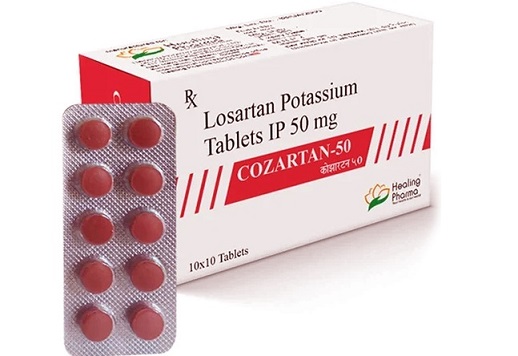COVID-19 Induces Expression of Anti-AGTR1 Autoantibodies, Causing Endothelial Dysfunction and Symptoms Treatable by Losartan
Nikhil Prasad Fact checked by:Thailand Medical News Team Jan 14, 2025 2 months, 4 weeks, 2 days, 13 hours, 8 minutes ago
Medical News: As the global scientific community continues to unravel the mysteries of COVID-19, a groundbreaking study has shed light on a previously underexplored dimension of the disease. Researchers from institutions including the University of São Paulo-Brazil, the University of Lübeck-Germany, and Tel Aviv University-Israel, among others, have discovered a compelling link between COVID-19 and the expression of anti-AGTR1 autoantibodies. These antibodies target angiotensin receptor type 1 (AGTR1), playing a pivotal role in endothelial dysfunction, which contributes to the diverse range of symptoms experienced by COVID-19 patients. This research presents significant implications for understanding and treating COVID-19.
 COVID-19 Induces Expression of Anti-AGTR1 Autoantibodies, Causing Endothelial Dysfunction and Symptoms Treatable by Losartan
The Background of Autoantibodies and COVID-19
COVID-19 Induces Expression of Anti-AGTR1 Autoantibodies, Causing Endothelial Dysfunction and Symptoms Treatable by Losartan
The Background of Autoantibodies and COVID-19
Autoantibodies (AABs) are antibodies that mistakenly target an individual's own proteins or tissues. This
Medical News report delves into the findings of a study that highlights how the dysregulation of AABs, particularly those targeting G protein-coupled receptors (GPCRs) and the renin-angiotensin system (RAS), is intricately linked to COVID-19 symptoms. Researchers analyzed 244 individuals through sophisticated statistical methods, including multivariate analysis and regression models, to assess how AABs correlate with symptoms such as anosmia, muscle aches, fever, and dysgeusia. Among the various AABs, anti-AGTR1 antibodies emerged as a strong predictor of these symptoms.
Key Findings of the Study
The researchers uncovered that levels of anti-AGTR1 antibodies were significantly elevated in COVID-19 patients compared to healthy controls. These antibodies, which disrupt the endothelial glycocalyx (eGC), were found to be a major factor in the progression of COVID-19 symptoms. The endothelial glycocalyx is a protective layer lining blood vessels, crucial for maintaining vascular integrity. Its degradation is a hallmark of severe COVID-19, leading to widespread endothelial dysfunction.
Importantly, the study demonstrated that the effects of these antibodies could be mitigated by losartan, a drug commonly used to treat hypertension. Losartan, an AGTR1 antagonist, was shown to restore glycocalyx height and stiffness in experimental models, highlighting its potential as a therapeutic intervention.
Understanding the Role of Anti-AGTR1 Antibodies
The study provided an in-depth analysis of the functional impact of anti-AGTR1 antibodies. Inflammation induced by these antibodies resulted in a concentration-dependent reduction in glycocalyx height by up to 25% and a 50% increase in stiffness. Such changes disrupt normal vascular function, contributing to symptoms like muscle pain and fever. Additionally, sensory deficits such as anosmia and dysgeusia were linked to microvascular damage caused by glycocalyx impairment.
Using advanced techniques such as random forest analysis and
principal component analysis, the study identified four core symptoms - anosmia, muscle aches, fever, and dysgeusia - as the most significant predictors of COVID-19 severity. The correlation between these symptoms and AAB levels underscores the potential of anti-AGTR1 antibodies as biomarkers for disease progression.
Potential Therapeutic Applications
Losartan’s ability to counteract the harmful effects of anti-AGTR1 antibodies opens new avenues for treatment. In experiments where losartan was coadministered with anti-AGTR1 antibodies, there was a nearly 45% restoration of glycocalyx height and an 18% reduction in stiffness. These findings suggest that losartan not only ameliorates vascular damage but also mitigates systemic inflammatory responses.
The use of losartan could extend beyond managing COVID-19 symptoms. Given the role of AGTR1 in the renin-angiotensin system, its modulation through losartan might offer broader benefits in addressing cardiovascular complications associated with COVID-19.
Implications for Clinical Practice
The study emphasizes the importance of identifying patients at risk of severe COVID-19 through routine screening for anti-AGTR1 antibodies. Incorporating such biomarkers into diagnostic protocols could enable early intervention, improving outcomes for patients with compromised vascular and immune function. Moreover, combining anti-AGTR1 antibody testing with existing diagnostic tools could enhance the precision of COVID-19 management strategies.
Conclusion and Future Directions
This research marks a significant step forward in understanding the autoimmune dimensions of COVID-19. By highlighting the role of anti-AGTR1 antibodies in endothelial dysfunction and symptom severity, the study provides a strong foundation for developing targeted therapies. Losartan’s potential to reverse glycocalyx damage and mitigate symptoms offers hope for patients grappling with the multisystemic effects of COVID-19.
Future research should focus on exploring additional pharmacological agents that target AGTR1-related pathways, as well as investigating the long-term implications of AAB dysregulation in post-COVID-19 conditions. Expanding these findings to diverse populations and integrating them into clinical practice could pave the way for more personalized and effective treatments for COVID-19.
The study findings were published in the peer-reviewed journal: npj Systems Biology and Applications.
https://link.springer.com/article/10.1038/s41540-025-00488-z
For the latest COVID-19 News, keep on logging to Thailand
Medical News.
Read Also:
https://www.thailandmedical.news/news/sulodexide-effectively-mitigates-thromboinflammation-and-endothelial-damage-reducing-risks-associated-with-long-covid
https://www.thailandmedical.news/news/sustained-effects-of-sars-cov-2-spike-protein-on-human-endothelial-cells
https://www.thailandmedical.news/news/covid-19-increases-disruptions-in-neurovascular-coupling,-inducing-endothelial-dysfunction-among-mild-cognitive-cases
https://www.thailandmedical.news/articles/coronavirus
